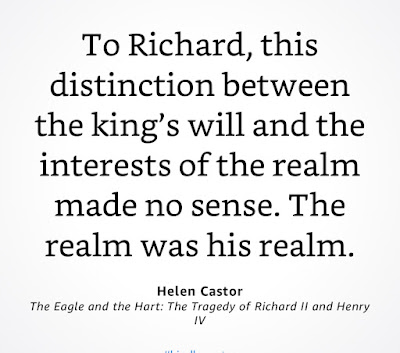When, at the start of this book, Castor began drawing explicit parallels between Richard II and the Donald, I wondered whether she might be applying an artificial sell-by date to her narrative.
This has been kicked down the road somewhat by Trump's election victory, but certain anxieties must remain.
I think the direction of travel, so to speak, is important: one should avoid applying modern political perspectives to the past, yet showing how the past might inform modern political perspectives is not so wrongheaded, per se.
At the stage that this sentence appears, the still adolescent Richard, approaching his sixteenth birthday and operating within a minority which had never been formalised as such, has evidently decided that he has no personal interest in the major issues — foreign and domestic — which are troubling almost every member of the elites around him, and can appreciate no distinction between his personal interests and those of the nation.
The Chancellor, Lord Scrope, has been forced to hand back the Great Seal after he dared to suggest that the young monarch might already be acting contrary to the needs of the realm.
And so, I suppose, here there could be hiding in plain sight a certain important lesson about holders of high office and how they go about locating themselves within the body politic.
Forty years earlier a rather random event, the Black Death, changed English social history forever. But the country’s political history was diverted around the same time by a more 'pinpoint' incidence of infirmity: the chronic and ultimately fatal disease picked up by Edward the Black Prince on campaign.
It is hard to underestimate the long term impact on the failure of this Prince of Wales to succeed his father. Instead a 'man-child' with authoritarian instincts took the throne in a manner where any checks and balances soon collapsed, in part because they simultaneously existed and did not exist, which is basically the worst of all worlds.
This eventually led to a coup, in turn setting off the Wars of the Roses, without which the Tudors could not have happened, and one would thus also have to question whether the Stuarts, the unification of the English and Scottish crowns, the Civil War and later the Glorious Revolution, would thus ever have occurred — so this ominously bad start to Richard II's reign had almost incalculable consequences for the English.


No comments:
Post a Comment